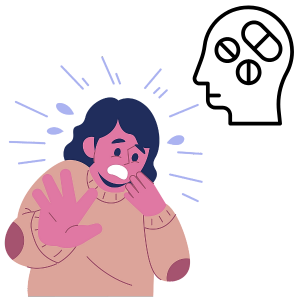
Dr Sathiya Ganesan’s
Guiding Young Lives From Risk to Recovery — With Compassion, Support, and Hope.
Compassionate, Confidential, and Evidence-Based Care for Young Lives Affected
Habits doesn’t just affect adults — children and adolescents are increasingly vulnerable to substance use, whether out of curiosity, peer pressure, trauma, or emotional distress. What begins as experimentation can quickly spiral into a pattern that disrupts mental health, family life, school, and future potential.
Substance Use Disorders (SUD) in youth require timely, trauma-informed, and age-appropriate intervention.
Dr. Sathiya Ganesan, Consultant Psychiatrist in Child and Adolescent Mental Health, offers specialised care for young people struggling with the Disorders, guiding them and their families through recovery with respect, empathy, and structured support.
Understanding Substance Use Disorders in Adolescents
Not Just a Behaviour — A Call for Help

Substance use in children and teens often masks deeper issues: emotional pain, trauma, low self-esteem, social anxiety, or mental health disorders. What appears as defiance or rebellion is often a coping strategy gone wrong.
Substances commonly misused by adolescents include:
- Alcohol
- Nicotine (cigarettes, vaping)
- Cannabis
- Inhalants
- Prescription medications (painkillers, stimulants)
- Other recreational or gateway drugs
Dr Sathiya Ganesan’s approach is non-judgmental, developmentally informed, and rooted in both psychiatry and family dynamics.
Signs of Substance Use in Children and Teens
- Sudden changes in behavior, mood, or friend circles
- Decline in academic performance or school refusal
- Lying, stealing, or secretive behavior
- Loss of interest in previously enjoyed activities
- Red eyes, frequent tiredness, or changes in appetite
- Aggression, withdrawal, or emotional instability
- Unexplained smells, items, or physical symptoms
If you suspect substance use, early evaluation is key to preventing long-term harm.
Holistic, In-Depth Evaluation
Dr. Ganesan begins with a comprehensive assessment that includes:
- Psychiatric evaluation and mental health screening
- Substance use history and behavioral patterns
- Family dynamics, peer influences, and trauma history
- Academic and social impact review
- Collaboration with caregivers and school personnel
This helps develop a clear picture of why the child is using substances, and what support is needed to begin recovery.
Compassionate Communication and Education
Young people struggling with aisorder often carry guilt, fear, or shame. Dr. Ganesan focuses on:
- Building rapport through trust and confidentiality
- Educating the child and family about aisorder as a health issue
- Validating emotions without endorsing harmful behavior
- Replacing self-blame with insight and self-awareness
Families are coached to respond with support, not stigma, which is key to recovery.
Expert Psychotherapeutic Interventions
Therapy is central to addressing both substance use and its emotional roots. Dr. Ganesan offers:
- Cognitive Behavioral Therapy (CBT) for managing cravings and triggers
- Motivational Enhancement Therapy to build internal readiness for change
- Trauma-informed therapy for children using substances to escape pain
- Relapse prevention techniques and coping skills training
- Family therapy to rebuild trust and support systems
These therapies help adolescents replace substance use with healthier, adaptive behaviors.
Careful, Judicious Use of Medications
In some cases, medication may be recommended to:
- Manage withdrawal symptoms or detox
- Treat co-existing conditions (e.g., depression, ADHD, anxiety)
- Reduce cravings or prevent relapse (e.g., naltrexone for alcohol use)
- Support emotional stability
Dr. Ganesan uses medication only when clinically appropriate and with full parental guidance.
Lifestyle Coaching and Mind-Body Healing
Disorder recovery isn’t only about stopping a behavior — it’s about rebuilding life. Dr. Ganesan encourages:
- Mindfulness, meditation, and grounding techniques
- Structured routines and sleep hygiene
- Art, music, or sports therapy to rediscover joy
- Academic support and return-to-school plans
- Healthy diet and exercise routines to support recovery
Young people are guided to find healthier ways to cope, connect, and thrive.
Support for Co-occurring Conditions
Many adolescents with SUD also struggle with:
- Depression or mood disorders
- ADHD or impulse control issues
- Trauma and PTSD
- Anxiety or social phobia
- Oppositional behaviors or conduct disorder
Dr. Ganesan offers integrated care that treats both the aisorder and the underlying mental health concerns.
Ongoing Family Involvement and Aftercare
Recovery is not a one-time event — it’s a process. Dr. Ganesan supports families through:
- Relapse prevention planning
- Monitoring emotional and behavioral changes
- Parent training for boundaries and support
- Sibling and caregiver education
- Long-term emotional healing and resilience building
Online Support and Flexible Consultations
For convenience and privacy, Dr. Sathiya Ganesan offers online sessions for:
- Therapy continuation
- Parent guidance
- Crisis check-ins
- Remote recovery support

Why Choose Dr. Sathiya Ganesan for Adolescent Behavirai Disorder Care?
With expertise in both psychiatry and adolescent behavior, Dr. Sathiya Ganesan offers behavirai disorder care that is:
- Age-appropriate and emotionally sensitive
- Rooted in empathy, science, and non-judgmental support
- Designed to restore the adolescent’s life, not just stop the substance
- Committed to whole-family healing and future success
Early Intervention Saves Futures — Let’s Begin the Journey to Recovery
If your child or teen is using substances or showing signs, timely care can make all the difference. Contact Dr. Sathiya Ganesan today for a confidential consultation and take the first step toward hope, healing, and lifelong well-being.
What’s the role of parents in recovery?
A huge one. Parent involvement improves therapy outcomes and relapse prevention. Dr. Ganesan coaches families throughout.
Can children and teens become addicted so early?
Yes. Even brief use of alcohol, cannabis, or inhalants can trigger dependency patterns in the developing brain.
Is rehab or hospitalization always necessary?
Not always. Many teens improve with outpatient therapy, behavioral support, and family engagement. Hospital care is used when medically or emotionally essential.
What if my child refuses help?
Dr. Ganesan uses motivational and non-confrontational techniques to build willingness. Involving trusted adults often improves participation.
Will my child be labeled or stigmatized?
No. All care is confidential and stigma-free. The goal is healing, understanding, and reintegration into life, school, and relationships.


